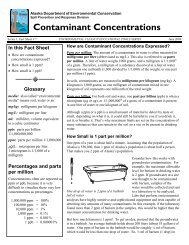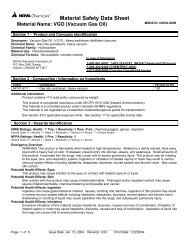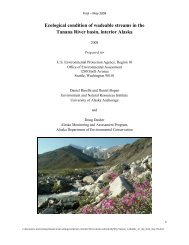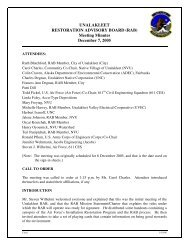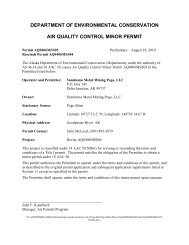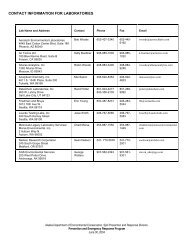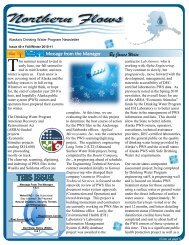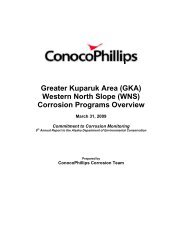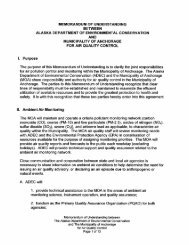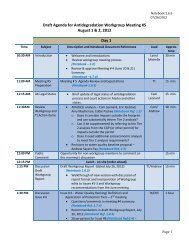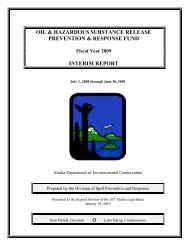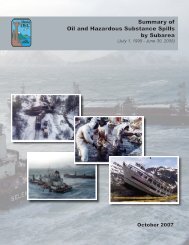- Page 1: 2012 Ocean Ranger Guidebook Revisio
- Page 5 and 6: 2012 Ocean Ranger Guidebook 3-7-12
- Page 7 and 8: 2012 Ocean Ranger Guidebook 3-7-12
- Page 9 and 10: 2012 Ocean Ranger Guidebook 3-7-12
- Page 11 and 12: 2012 Ocean Ranger Guidebook 3-7-12
- Page 13 and 14: 2012 Ocean Ranger Guidebook 3-7-12
- Page 15 and 16: 2012 Ocean Ranger Guidebook 3-7-12
- Page 17 and 18: 2012 Ocean Ranger Guidebook 3-7-12
- Page 19 and 20: 2012 Ocean Ranger Guidebook 3-7-12
- Page 21 and 22: 2012 Ocean Ranger Guidebook 3-7-12
- Page 23 and 24: 2012 Ocean Ranger Guidebook 3-7-12
- Page 25 and 26: 2012 Ocean Ranger Guidebook 3-7-12
- Page 27 and 28: 2012 Ocean Ranger Guidebook 3-7-12
- Page 29 and 30: 2012 Ocean Ranger Guidebook 3-7-12
- Page 31 and 32: 2012 Ocean Ranger Guidebook 3-7-12
- Page 33 and 34: 2012 Ocean Ranger Guidebook 3-7-12
- Page 35 and 36: 2012 Ocean Ranger Guidebook 3-7-12
- Page 37 and 38: 2012 Ocean Ranger Guidebook 3-7-12
- Page 39 and 40: 2012 Ocean Ranger Guidebook 3-7-12
- Page 41 and 42: 2012 Ocean Ranger Guidebook 3-7-12
- Page 43 and 44: 2012 Ocean Ranger Guidebook 3-7-12
- Page 45 and 46: 2012 Ocean Ranger Guidebook 3-7-12
- Page 47 and 48: 2012 Ocean Ranger Guidebook 3-7-12
- Page 49 and 50: 2012 Ocean Ranger Guidebook 3-7-12
- Page 51 and 52: 2012 Ocean Ranger Guidebook 3-7-12
- Page 53 and 54:
2012 Ocean Ranger Guidebook 3-7-12
- Page 55 and 56:
2012 Ocean Ranger Guidebook 3-7-12
- Page 57 and 58:
2012 Ocean Ranger Guidebook 3-7-12
- Page 59 and 60:
2012 Ocean Ranger Guidebook 3-7-12
- Page 61 and 62:
2012 Ocean Ranger Guidebook 3-7-12
- Page 63 and 64:
2012 Ocean Ranger Guidebook 3-7-12
- Page 65 and 66:
2012 Ocean Ranger Guidebook 3-7-12
- Page 67 and 68:
2012 Ocean Ranger Guidebook 3-7-12
- Page 69 and 70:
2012 Ocean Ranger Guidebook 3-7-12
- Page 71 and 72:
2012 Ocean Ranger Guidebook 3-7-12
- Page 73 and 74:
2012 Ocean Ranger Guidebook 3-7-12
- Page 75 and 76:
2012 Ocean Ranger Guidebook 3-7-12
- Page 77 and 78:
2012 Ocean Ranger Guidebook 3-7-12
- Page 79 and 80:
GENERAL PERMIT NO. 2009DB0026 Page
- Page 81 and 82:
2012 Ocean Ranger Guidebook 3-7-12
- Page 83 and 84:
2012 Ocean Ranger Guidebook 3-7-12
- Page 85 and 86:
2012 Ocean Ranger Guidebook 3-7-12
- Page 87 and 88:
2012 Ocean Ranger Guidebook 3-7-12
- Page 89 and 90:
2012 Ocean Ranger Guidebook 3-7-12
- Page 91 and 92:
2012 Ocean Ranger Guidebook 3-7-12
- Page 93 and 94:
2012 Ocean Ranger Guidebook 3-7-12
- Page 95 and 96:
2012 Ocean Ranger Guidebook 3-7-12
- Page 97 and 98:
2012 Ocean Ranger Guidebook 3-7-12
- Page 99 and 100:
2012 Ocean Ranger Guidebook 3-7-12
- Page 101 and 102:
2012 Ocean Ranger Guidebook 3-7-12
- Page 103 and 104:
2012 Ocean Ranger Guidebook 3-7-12
- Page 105 and 106:
2012 Ocean Ranger Guidebook 3-7-12
- Page 107 and 108:
2012 Ocean Ranger Guidebook 3-7-12
- Page 109 and 110:
2012 Ocean Ranger Guidebook 3-7-12
- Page 111 and 112:
2012 Ocean Ranger Guidebook 3-7-12
- Page 113 and 114:
2012 Ocean Ranger Guidebook 3-7-12
- Page 115 and 116:
2012 Ocean Ranger Guidebook 3-7-12
- Page 117 and 118:
2012 Ocean Ranger Guidebook 3-7-12
- Page 119 and 120:
2012 Ocean Ranger Guidebook 3-7-12
- Page 121 and 122:
2012 Ocean Ranger Guidebook 3-7-12
- Page 123 and 124:
2012 Ocean Ranger Guidebook 3-7-12
- Page 125 and 126:
2012 Ocean Ranger Guidebook 3-7-12
- Page 127 and 128:
2012 Ocean Ranger Guidebook 3-7-12
- Page 129 and 130:
2012 Ocean Ranger Guidebook 3-7-12
- Page 131 and 132:
2012 Ocean Ranger Guidebook 3-7-12
- Page 133 and 134:
2012 Ocean Ranger Guidebook 3-7-12
- Page 135 and 136:
2012 Ocean Ranger Guidebook 3-7-12
- Page 137 and 138:
2012 Ocean Ranger Guidebook 3-7-12
- Page 139 and 140:
2012 Ocean Ranger Guidebook 3-7-12
- Page 141 and 142:
2012 Ocean Ranger Guidebook 3-7-12
- Page 143 and 144:
2012 Ocean Ranger Guidebook 3-7-12
- Page 145 and 146:
2012 Ocean Ranger Guidebook 3-7-12
- Page 147 and 148:
2012 Ocean Ranger Guidebook 3-7-12
- Page 149 and 150:
2012 Ocean Ranger Guidebook 3-7-12
- Page 151 and 152:
2012 Ocean Ranger Guidebook 3-7-12
- Page 153 and 154:
2012 Ocean Ranger Guidebook 3-7-12
- Page 155 and 156:
2012 Ocean Ranger Guidebook 3-7-12
- Page 157 and 158:
2012 Ocean Ranger Guidebook 3-7-12
- Page 159 and 160:
2012 Ocean Ranger Guidebook 3-7-12
- Page 161 and 162:
2012 Ocean Ranger Guidebook 3-7-12
- Page 163 and 164:
2012 Ocean Ranger Guidebook 3-7-12
- Page 165 and 166:
2012 Ocean Ranger Guidebook 3-7-12
- Page 167 and 168:
2012 Ocean Ranger Guidebook 3-7-12
- Page 169 and 170:
2012 Ocean Ranger Guidebook 3-7-12
- Page 171 and 172:
2012 Ocean Ranger Guidebook 3-7-12
- Page 173 and 174:
2012 Ocean Ranger Guidebook 3-7-12
- Page 175 and 176:
2012 Ocean Ranger Guidebook 3-7-12
- Page 177 and 178:
2012 Ocean Ranger Guidebook 3-7-12
- Page 179 and 180:
2012 Ocean Ranger Guidebook 3-7-12
- Page 181 and 182:
2012 Ocean Ranger Guidebook 3-7-12
- Page 183 and 184:
2012 Ocean Ranger Guidebook 3-7-12
- Page 185 and 186:
2012 Ocean Ranger Guidebook 3-7-12
- Page 187 and 188:
2012 Ocean Ranger Guidebook 3-7-12
- Page 189 and 190:
2012 Ocean Ranger Guidebook 3-7-12
- Page 191 and 192:
2012 Ocean Ranger Guidebook 3-7-12
- Page 193 and 194:
2012 Ocean Ranger Guidebook 3-7-12
- Page 195 and 196:
2012 Ocean Ranger Guidebook 3-7-12
- Page 197 and 198:
2012 Ocean Ranger Guidebook 3-7-12
- Page 199 and 200:
2012 Ocean Ranger Guidebook 3-7-12
- Page 201 and 202:
2012 Ocean Ranger Guidebook 3-7-12
- Page 203 and 204:
2012 Ocean Ranger Guidebook 3-7-12
- Page 205 and 206:
2012 Ocean Ranger Guidebook 3-7-12
- Page 207 and 208:
2012 Ocean Ranger Guidebook 3-7-12
- Page 209 and 210:
2012 Ocean Ranger Guidebook 3-7-12
- Page 211 and 212:
2012 Ocean Ranger Guidebook 3-7-12
- Page 213 and 214:
2012 Ocean Ranger Guidebook 3-7-12
- Page 215 and 216:
2012 Ocean Ranger Guidebook 3-7-12
- Page 217 and 218:
2012 Ocean Ranger Guidebook 3-7-12
- Page 219 and 220:
2012 Ocean Ranger Guidebook 3-7-12
- Page 221 and 222:
2012 Ocean Ranger Guidebook 3-7-12
- Page 223 and 224:
2012 Ocean Ranger Guidebook 3-7-12
- Page 225 and 226:
2012 Ocean Ranger Guidebook 3-7-12
- Page 227 and 228:
2012 Ocean Ranger Guidebook 3-7-12
- Page 229 and 230:
2012 Ocean Ranger Guidebook 3-7-12
- Page 231 and 232:
2012 Ocean Ranger Guidebook 3-7-12
- Page 233 and 234:
2012 Ocean Ranger Guidebook 3-7-12
- Page 235 and 236:
2012 Ocean Ranger Guidebook 3-7-12
- Page 237 and 238:
2012 Ocean Ranger Guidebook 3-7-12
- Page 239 and 240:
2012 Ocean Ranger Guidebook 3-7-12
- Page 241 and 242:
In May of 1965, a total of 15” of
- Page 243 and 244:
2/25/2012 CPVEC Ocean Ranger Progra
- Page 245 and 246:
2012 Ocean Ranger Guidebook 3-7-12
- Page 247 and 248:
2012 Ocean Ranger Guidebook 3-7-12
- Page 249 and 250:
2012 Ocean Ranger Guidebook 3-7-12
- Page 251 and 252:
2012 Ocean Ranger Guidebook 3-7-12
- Page 253 and 254:
2012 Ocean Ranger Guidebook 3-7-12
- Page 255 and 256:
2012 Ocean Ranger Guidebook 3-7-12
- Page 257 and 258:
2012 Ocean Ranger Guidebook 3-7-12
- Page 259 and 260:
2012 Ocean Ranger Guidebook 3-7-12
- Page 261 and 262:
2012 Ocean Ranger Guidebook 3-7-12
- Page 263 and 264:
2012 Ocean Ranger Guidebook 3-7-12
- Page 265 and 266:
2012 Ocean Ranger Guidebook 3-7-12
- Page 267 and 268:
2012 Ocean Ranger Guidebook 3-7-12
- Page 269 and 270:
2012 Ocean Ranger Guidebook 3-7-12
- Page 271 and 272:
2012 Ocean Ranger Guidebook 3-7-12
- Page 273:
2012 Ocean Ranger Guidebook 3-7-12



